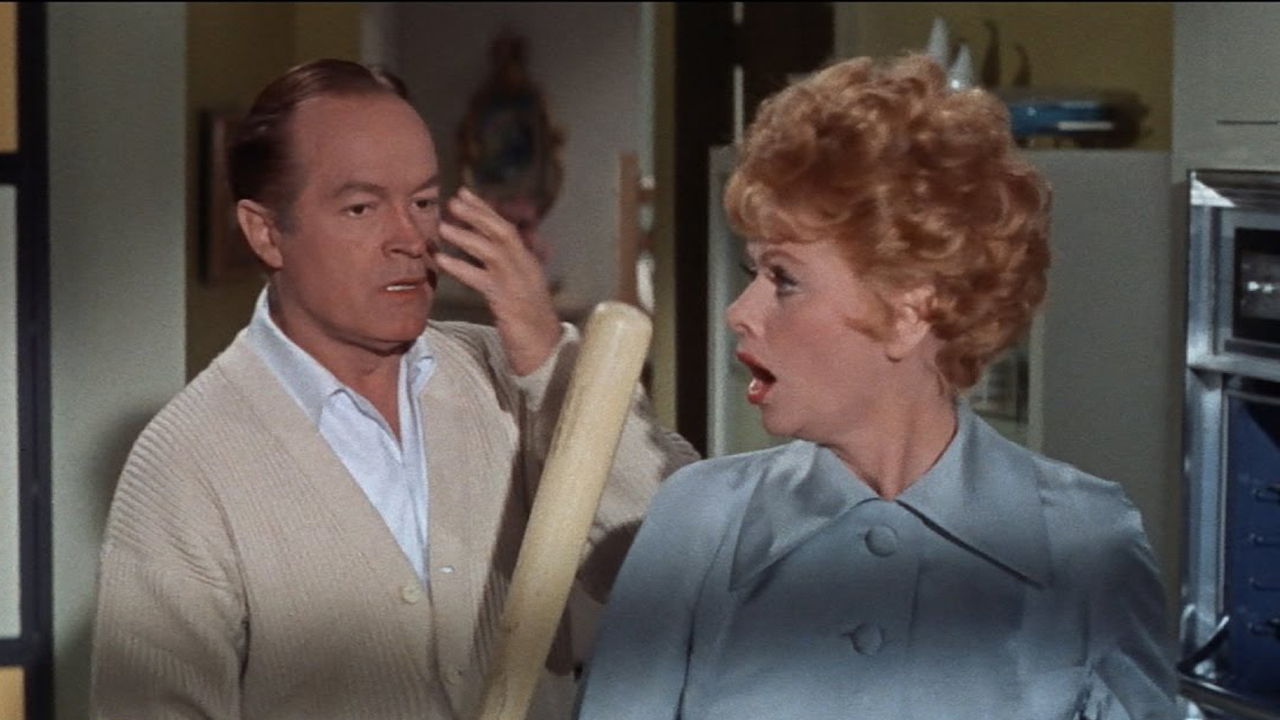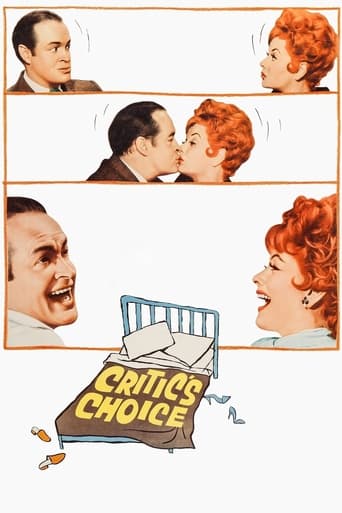

You have some serious subject matter in this 1963 film with Lucille Ball trying desperately to get out of the kitchen and become a Broadway playwright. Trouble is that husband Bob Hope is a tough film critic who has panned his first wife's (Marilyn Maxwell) play. There is a strange relationship that Hope's son has with his mother, the Maxwell character. Apparently, she has allowed the Hope character to have full custody of the child. She is the woman where a career comes first.The film tends to go downhill near the end when a very drunken Hope causes disruption at the theater where the play is opening on opening night.Jesse Royce Landis,as Ball's mother and Rip Torn, as a Greek director,both give ample support.Lucy is not her usual Lucy here and I enjoyed her character change.
... View MoreBroadway theatre critic Bob Hope (as Parker Ballantine) is known for his stinging reviews of bad plays. When beautiful red-haired wife Lucille Ball (as Angela "Angie " Ballantine) decides to become a playwright, Mr. Hope decides he will be completely objective in reviewing her work. Hope doesn't like the first draft and refuses to help Ms. Ball during re-writes and run-throughs. Ball is encouraged by a producer's interest and works closely with younger director Rip Torn (as Dion Kapakos); a romance, or the potential for one, develops. Meanwhile, Hope is perused by still-interested first wife Marilyn Maxwell (as Ivy London)...With all the re-writes, it's odd nobody re-wrote "Critic's Choice"...Hope's character is unlikable, and he's not a competent reviewer; he walks out of the opening play, which the audience enjoys, and declares it bad. Hope writes a review of Ball's play even though he was too drunk to see anything. Hope should have helped Ball and excused himself from reviewing her play. The relationship between Ball and Mr. Torn is confusing. Little Ricky Kelman (as John) should have been Ball's son; in the original play, the character "Angela" was too old to have a 12-year-old son. By the way, young Kelman and older Jessie Royce Landis (as Charlotte "Charlie" Orr) do well in supporting the legendary co-stars.**** Critic's Choice (4/3/63) Don Weis ~ Bob Hope, Lucille Ball, Ricky Kelman, Rip Torn
... View MoreIra Levin's play Critic's Choice which ran 189 performances on Broadway in the 1960-1961 season was expanded exponentially for the screen version. It's Broadway origins are hardly noticeable.Stepping into the roles played on stage by Henry Fonda and Georgeann Johnson are Bob Hope and Lucille Ball in their fourth and last film together. The more traditional Hope and traditional Lucy are to be found in their earlier films Sorrowful Jones and Fancy Pants. Still Critic's Choice works a whole lot better for them than The Facts of Life.Bob Hope is a theater critic and he's got a son by his first marriage to Marilyn Maxwell, Ricky Kelman. He's married now to Lucille Ball and Lucy's taken it in her head to write a play about her family life growing up with two sisters, Marie Windsor and Joan Shawlee, and her mother Jessie Royce-Landis. Hope fluffs the idea off, but this only makes Lucy more determined especially when she's working with director Rip Torn and producer John Dehner.There are a ton of characters not in the original play which took place in the Hope/Ball apartment. The addition of a lot of these people allowed Hope and Lucy to engage in some of their traditional comedy which they didn't do in The Facts of Life and paid dearly for it.This has to be the only film I know where the 'other' woman is the first wife. Marilyn Maxwell who it was reputed Hope was involved with around 1950 and who appeared in The Lemon Drop Kid with him, sees her chance back with him as Rip Torn starts to get interested in Lucy.Bob and Lucy get good support from a well chosen cast of familiar faces and Critic's Choice should please their fans.
... View MoreIf you normally associate the name 'Lucille Ball' with a crazy redhead who is outgoing, somewhat loud, and exciting, then this is definitely not the right movie for your Lucy collection. It is repetitive, humourless and quite dull, if I might say... Lucy plays a very quiet and stubborn woman in the film, and Bob Hope is not at his very best. It was actually quite disappointing to watch this film, I am sure that there are many more films with the same cast for you to enjoy with better quality...
... View More